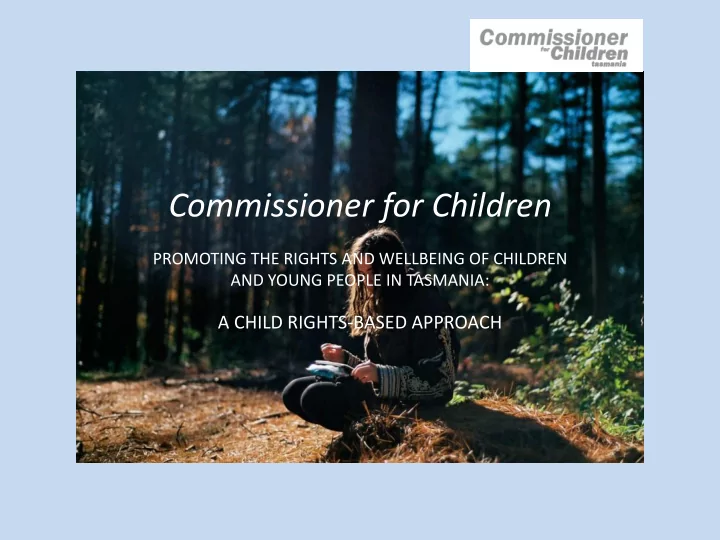

Commissioner for Children PROMOTING THE RIGHTS AND WELLBEING OF CHILDREN AND YOUNG PEOPLE IN TASMANIA: A CHILD RIGHTS-BASED APPROACH
UN CONVENTION ON THE RIGHTS OF THE CHILD • A primary focus of the Commissioner for Children is to promote the rights and wellbeing of Tasmanian children and young people. • The Commissioner’s work is guided by and informed by the principles of the UN Convention on the Rights of the Child (CRC) • CRC sets out a framework of rights that are essential to the promotion and protection of children’s interests and wellbeing . By well-being eing we are talking about children’s care, development lopment, • educ ucat ation ion, healt lth and safety ty.
UN CONVENTION ON THE RIGHTS OF THE CHILD • CRC recognises that children have the same human rights as adults, but that they need additional protections because of their vulnerability. • Australia ratified the CRC in 1990 and it came into force in Australia in 1991. Committee on the Rights of the Child – issues General Comments which • provide an authoritative interpretation of the rights contained in the articles and provisions of the CRC Although the CRC is not fully incorporated into Australian domestic • legislation, governments are obliged to promote its implementation.
GENERAL PRINCIPLES OF CRC There are 4 ‘general principles’ under CRC which are considered fundamental to implementation of all other rights: • the right to non-discrimination (article 2) • the child’s best interests as a primary consideration (article 3) the right to life, survival and development (article 6) • • respect for the views of the child (article 12)
ARTICLE 12: RESPECT FOR THE VIEWS OF THE CHILD Children have a right to have a say in decisions that affect them and for • their views to be taken into account. • Also known as the “Right to be Heard” or the “Right to Participate” • This participatory right is a ‘key principle’ of the CRC - it is fundamental to the fulfilment of other child rights. • A ‘gateway right’ (per National Children’s Commissioner).
ARTICLE 12: RESPECT FOR THE VIEWS OF THE CHILD • CRC enhances children’s participation by recognising the right to seek and receive information and the right to freedom of expression • Research shows that even very young children are able to form views. • CfC’s advocacy work is informed by consultations with children and young people across Tasmania: – advisory groups – schools consultations – consultations with other specialised groups
ARTICLE 12: RESPECT FOR THE VIEWS OF THE CHILD • During our recent consultations about child safe organisations, children said they want adults to listen to them more and for adults to take what they say seriously. • The National Children’s Commissioner also heard this message loud and clear during her Big Banter Tour of Australia. • Children do have capacity to engage in detailed discussion about important and sometimes sensitive issues.
WHY IS CHILDREN’S PARTICIPATION IMPORTANT? • Decision making is improved when it is informed by those with direct experiences of a situation. Children are experts in their own lives. • We increase the visibility of children’s issues. • We enable children to be more actively involved in their community – they are “makers and shapers” not just passive beneficiaries. • We teach children respect for other’s rights too. • Children tell us that “listening” is the most important thing that adults can do to make things better for children.
HOW TO PROMOTE PARTICIPATION? Examples of how to promote participation: 1. Practical steps/things to take into account when consulting with children. 2. Ensuring children’s voices can be heard in the context of complaints.
PRACTICAL STEPS If participation is to be effective an meaningful, it should be seen as a proce cess ss. There is consensus on the following requirements for such participation: 1. Transparent and informative 2. Voluntary – informed consent 3. Respectful 4. Relevant 5. Child friendly 6. Inclusive 7. Supported by training (children can be involved) 8. Safe – sensitive to risk 9. Accountable - encourage and provide feedback Ref: Unicef & Save the Children, Every Child’s Right to be Heard : A Resource Guide on the UN Committee on the Rights of the Child General Comment No 12 , 2011, p152.
EXAMPLE OF IMPLEMENTING ARTICLE 12 - COMPLAINTS • Often, complaint systems are inaccessible to children and therefore underutilised. • Complaints are part of quality improvement. • Children and young people usually have a very good idea about possible solutions • Complaints are an important mechanism for protecting children from abuse and other unacceptable behaviour
ENSURING CHILDREN’S VOICES CAN BE HEARD IN THE CONTEXT OF COMPLAINTS • Make complaint systems accessible to children • Take children’s views seriously • Make the system responsive • Support and advocacy if child wishes • Be respectful, understanding and willing to take action Resource: WA Commissioner for Children’s Guidelines Are You Listening? June 2013
Any Questions?
Recommend
More recommend